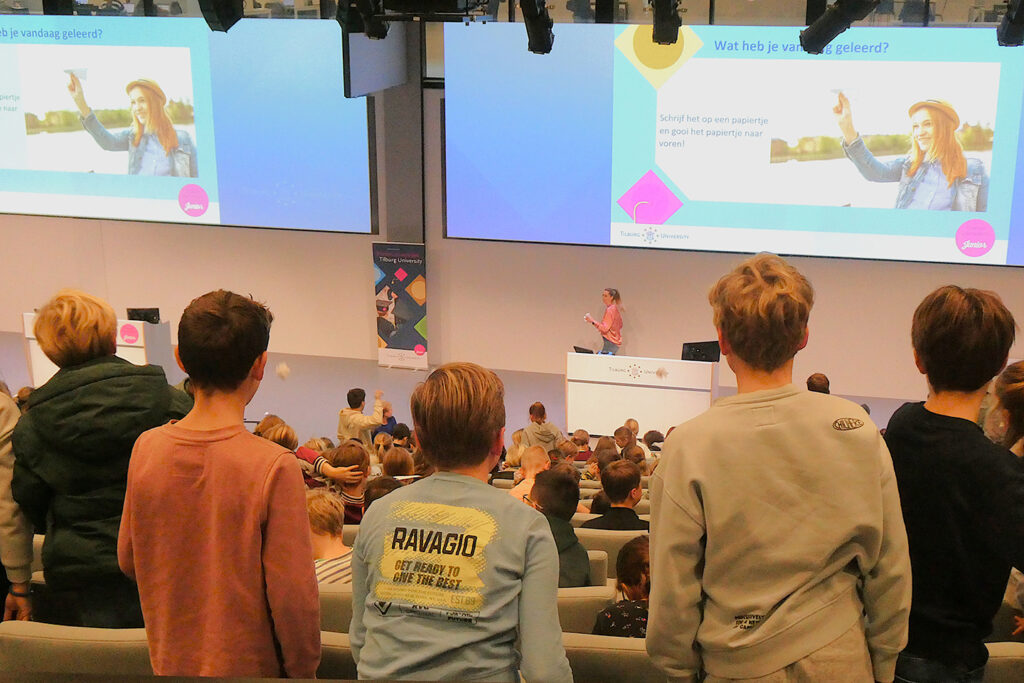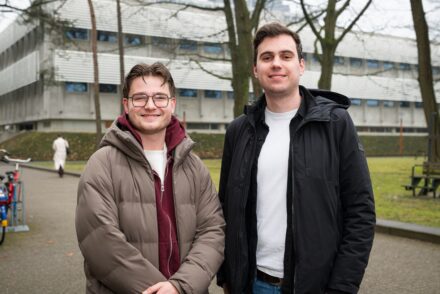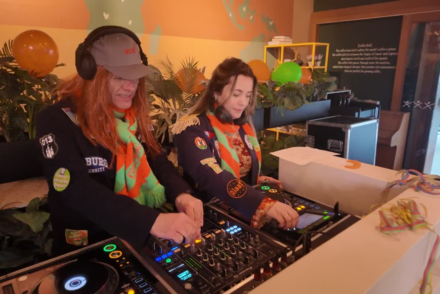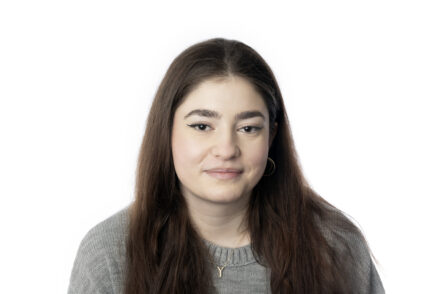Scientists in front of the class at the Children’s University: ‘I’m a doctor, but not a doctor at your bedside’
Should you always believe influencers? And what is true on the internet? These are questions that communication scientist Emmelyn Croes of the Faculty of Humanities puts to six hundred curious primary school pupils. The children attend a lecture at the Children’s University. For them it is a nice outing and they also learn something from it.

The lecture starts a little later than planned on Wednesday morning. It takes twenty minutes before all students are inside the large lecture hall of Cube. Only when all six hundred children and their supervisors find a place, ‘Miss Emmelyn’ can start her lecture.
Emmelyn Croes of the Faculty of Humanities conducts research into the use of media and technology and its influence on society. ‘I can call myself a doctor, but that’s not the same as a doctor at your bedside,’ she explains at the beginning of the lesson.
Teacher also learn
‘What is this?’ Croes asks the audience while she shows a logo on the big screen. ‘TikTok’, the audience shouts. ‘And this?’ asks Croes when she shows another logo. “Instagram,” it sounds even louder. The college of Croes is specially adapted to the young audience.
Linda Parasiz of Tilburg University Junior supervises the academics who are often standing in front of a group of children for the first time. Because it requires a different approach than their own lectures: ‘You have to go back to basics much more if you have to explain your work to children. Teachers also learn from this, because if you can explain it to children, you can also tell adults in an accessible way. So it’s a very good exercise for scientists and they really appreciate that.’
Who has an account?
‘Who is on social media and who has their own account?’ Croes asks the audience. A lot of hands go up in the air. ‘Don’t do it, stay off social media for as long as possible,’ is her surprising advice.
Noud and Crijn from St. Cecilia primary school in Berkel-Enschot are mainly on YouTube, they indicate in a separate conversation. No, not on TikTok, they deny, but their mischievous eyes say otherwise. Noud especially likes videos about Minecraft, the game with which you can recreate entire worlds, and Crijn prefers to watch Glowmovies, a channel on which two boys build secret bunkers and a house of a thousand pallets.
‘Don’t do it, stay away from it as long as possible’
The lesson continues about influencers. ‘Who are these?’ ‘Girl Djamilla, Enzo Knol,’ the audience shouts. They know their heroes. ‘I’m also on social media myself,’ Croes admits. My favorite influencer is Fit Green Mind, because I like to watch cooking videos.’
Quiz
The attention threatens to slowly fade away after three quarters of an hour. A quiz brings new energy to the room. ‘Hair gummies make your hair shine. Is that a fact or an opinion?’ asks Croes. The students receive colored cards with which they can answer her question.
‘A green card stands for a fact and a red card for an opinion,’ Croes explains. The red cards shoot up into the air. ‘Indeed, this is an opinion, and why?’ ‘It’s an opinion because they advertise,’ one of the students thinks out loud.
Children learn not to believe just anything. ‘Sometimes something is clearly not real, like a baby who can talk, but how do you check if something is fake if it is not so obvious?’ Croes comes up with a checklist and a list of reliable sources such as the Youth News, Kidsweek and Schooltv and as a final tip: ‘Talk about it with your parents or with someone who knows about it.’
Important lesson
‘I’ve always wanted to do it once,’ Croes looks back with satisfaction after class, ‘because I think it’s very important that children learn to look critically at social media and misinformation. In doing so, they learn what we do here at the university. I don’t think a lot of children say: I want to be a researcher when I grow up, so it’s good to put these kinds of jobs and studies on the map.
‘Finally, it’s also good that they are already walking around the campus at a young age. Then they can see what is happening here and get a feeling for it. Then the university will also become more approachable for young children.’








